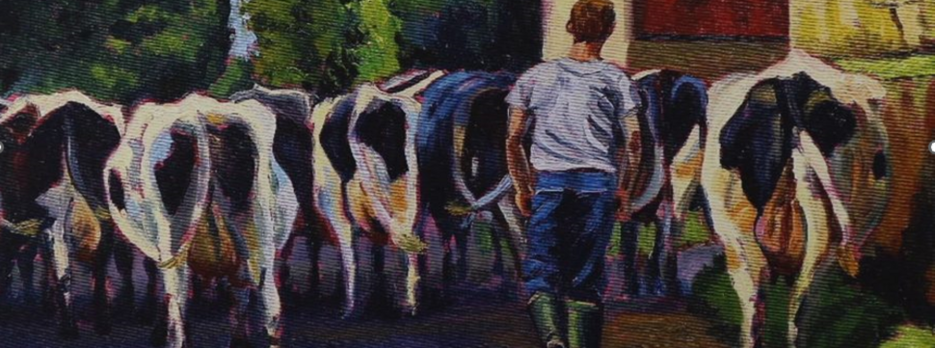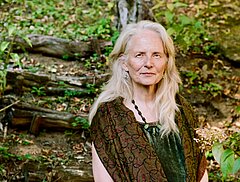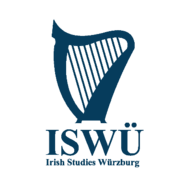Symposium: The Animal in Ireland, Real and Imagined
| Datum: | 27.03.2024, 18:00 - 16:30 Uhr |
| Ort: | Hubland Süd, Geb. Z6 (Zentrales Hörsaal- u. Seminargebäude), 2.010 & 2.011 and Toscanasaal and Martin von Wagner Museum, Residenz Würzburg & online |
| Vortragende: | Dr. Maureen O’Connor, Prof. Dr. Ina Bergmann, Prof. Dr. Maria Eisenmann and Prof. Dr. Kirsten Sandrock |
The Animal in Ireland, Real and Imagined: An International and Interdisciplinary Symposium
Irish cultural identity has been closely identified with the animal from the beginning of recorded history and beyond. Irish mythology and folklore, like all traditional lore, feature nonhuman animals, hybrid human-nonhuman beings, and tales of metamorphosis between the two. Warm familiarity with and respectful honouring of the nonhuman animal has been a part of Irish culture from pre-Christian times when wealth and status were measured in cattle, and the gods regularly assumed the form of deer, hares, boars, ravens, and wolves. Animals were not only central to pre-Christian cultural production, but also frequently appeared in early Christian texts, evident in the writings of ninth-century monks, in poems like “Pangur Bán” and “The Hermit’s’ Wish” (that he could be like a bird), and in the illuminations that make the Book of Kells an enduring object of fascination. One of the oldest surviving manuscripts in Irish literature is The Book of the Dun Cow (c.1100), a title evoked by John Connell’s best-selling memoir of 2018, The Cow Book: A Story of Life on the Family Farm. However, this close affinity with animals helped rationalise the centuries-long tradition of representing the Irish as themselves not fully human, especially by English occupiers and colonisers. The longstanding predominance of the rural in defining Irish culture and “authentic” Irish identity has also contributed to the development of a conflicted attitude toward the nonhuman, implicitly associated with both the humiliations of colonial occupation and the embarrassing survival of cartoonish images of thick, bumpkin “Paddy,” who enjoyed suspiciously congenial relations with his pig. In a time of overlapping ecological crises, this conference will consider the ramifying significance of the nonhuman animal in Irish life and culture from multiple perspectives, a return to acknowledging and honouring the interdependence of the human and nonhuman worlds. As Serenella Iovino has suggested, “The fact that literary representations are able to increase our awareness about the relationship between the human and nonhuman worlds, also in terms of moral values, can be understood as a result of such a dynamics of interdependence.”
The international symposium “The Animal in Ireland, Real and Imagined” addresses these and other questions from an interdisciplinary perspective. This symposium is organised by Maureen O’Connor, Ina Bergmann, Maria Eisenmann and Kirsten Sandrock.
Programme Highlights
Poetry Reading
Moya Cannon
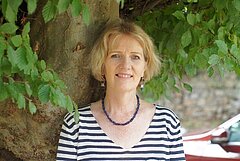 | Moya Cannon is an Irish poet. She has published six collections of poetry. Her Collected Poems (Carcanet Press, Manchester) was published in 2021 and a new collection, ‘Bunting’s Honey’, is forthcoming from Carcanet Press in 2025. She has been a recipient of the Brendan Behan Award and the O’Shaughnessy Award and was Heimbold Professor of Irish Studies at the University of Villanova. She is a member of Aosdána, the state-supported affiliation of Irish artists. In her poems, history, archaeology, pre-historic art, geology and music figure as gateways to a deeper understanding of our mysterious relationship with the natural world and with our past. Ein Privates Land, a bilingual selection of poems with German translations by Eva Bourke and Eric Giebel, was published by Offends Feld Press in 2017. Bilingual selections of her poems have also been translated into Spanish and Portugueuse. She was born and grew up in Co. Donegal, Ireland, studied history and politics at University College, Dublin, and International Relations at Corpus Christi College, Cambridge. She spent most of her adult life in Galway and now lives in Dublin. |
Music
Ella Zlotos, Georg Zobel & Nik Jira
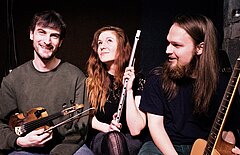 | Ella Zlotos is a flutist, songwriter and teacher based in Würzburg. She learned to play tin and low whistle in Ireland and has been contributing to various folk and crossover projects throughout Europe and the UK. www.ellazlotos.de Georg Zobel took up the fiddle in 2007 and has acquired a broad range of Irish and Scottish traditional tunes and techniques since. He has been playing lots of sessions and gigs in the local Irish trad scene around Würzburg. Nik Jira is a freelance musician, composer and audio engineer. He studied piano at HfM Würzburg and has been playing the guitar for several years, being especially interested in traditional Irish folk tunings, which he also uses in his own compositions www.jiranikolaus.de |
Keynotes
Kathryn Kirkpatrick (Appalachian State University, NC, USA)
Martín Veiga (University College Cork, Ireland)
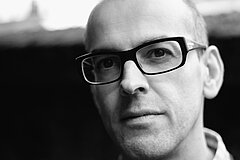 | Martín Veiga is a senior lecturer in Hispanic Studies at University College Cork and the director of the Irish Centre for Galician Studies. He is the co-editor of Galicia 21. Journal of Contemporary Galician Studies, one of the convenors of the research cluster ‘Translation and Creative Practice’ (Centre for Advanced Studies in Languages and Cultures, UCC), and a member of the research project ‘Post-Human Intersections in Irish and Galician Literatures’ (Universidade de Santiago de Compostela). His main research areas are contemporary Galician and Irish poetry, literary translation, ecocriticism, and travel writing and mobility narratives in the Iberian context. He has published extensively on the life and work of Galician poet Antón Avilés de Taramancos. His books include the monograph Escribir na multitude: A obra literaria de Antón Avilés de Taramancos (2014), the co-edited volumes A Different Eden: Ecopoetry from Ireland and Galicia (2021) and Here and Beyond: Narratives of Travel and Mobility in Iberian Culture (2022), and a special issue of the journal Galicia 21 entitled ‘Text, Image, Archive: Galician Literature and the Visual Arts’ (2022). He has also published six award-winning poetry collections in Galician, the bilingual anthology Alfaias na lama: poesía selecta 1990-2020 / Jewels in the Mud: Selected Poems 1990-2020 (2020), and translations of works by John Berger, Anne Michaels and T. S. Eliot, among others. In 2017, Veiga received the Premio Pedrón de Honra for his trajectory in the international promotion of Galician culture. |
Further Information


